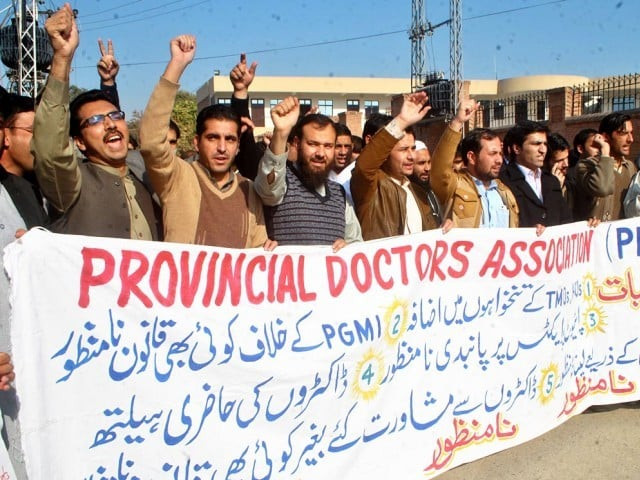Deconstructing the battle: K-P govt intensifies offensive against anti-MTI doctors
Protesters unfazed even after attorney general consulted for possible legal action

Protesters unfazed even after attorney general consulted for possible legal action. PHOTO: ONLINE
The government already served notices to 130 health employees including doctors, paramedics and others. With jobs at line and doctors undaunted, it merits a look back at how the current situation reached this pinnacle.
Revolution via reforms?
The Pakistan Tehreek-e-Insaf (PTI)-led provincial government had campaigned on a platform of several revolutions, including one in the health sector. After some time in power, it said a group of experts proposed certain changes which resulted in the Medical Teaching Institutions (MTI) Reforms Act.
These changes were seen by the protesting health employees as a step towards privatising government-run health facilities.
The administration time and again stated the hospitals were not privatised, but granted “autonomy”. The board of governors, according to health officials, would be empowered to hire competent people to run the system. Hospitals would generate their own money and the amount would be spent on improvements and patient care.
The act was challenged in a court of law and there were murmurs of the word ‘privatisation’.
It was claimed the board members were hired on high salaries and the word nepotism was also brought into play. This was denied by the government which claimed members were chosen from their respective fields to share expertise and would offer their services voluntarily.
After a legal battle between doctors—whom the government claimed were few in number—and the administration, the court ruled in favour of the latter. This paved the way for the government to implement its reforms.
Working swiftly, the K-P government announced the dissolution or devolution (depending on whom one spoke to) of the Post Graduate Medical Institution (PGMI) within a few days of the court order and formed a centralised committee to induct trainee medical officers (TMOs).
Divide and rule
The doctors, whom Minister for Health Shahram Tarakai claimed again were few in number, were not afraid to resist. They started demonstrations against actions they considered would not benefit anyone, while the government took another step and held meetings with associations who were willing to hear its point of view.
“We condemn the minority with vested interests which is continuously misleading the health community and taking advantage of judicial procedures to slow progress,” read a joint declaration of doctors representatives at CM House on February 1.
One doctor in attendance at this meeting who claimed to be part of the Young Doctors Association, one of the dissenting organisations, had been relieved of his membership in 2015. YDA Patron-in-Chief Dr Alamgir said those doctors who attended the meeting with the chief minister were part of the government’s agenda. He added Dr Zubair, who called himself a YDA member, was no longer part of the association.
YDA, the Health Employees Coordination Council (HECC) and around 10 other associations announced the boycott of services at tertiary hospitals and claimed they were supported by paramedics, nurses, clerks, IT staff and Class-IV employees.
The out-patient departments of hospitals were locked but the Provincial Doctors Association (PDA) and the PTI-backed Insaf Doctors Forum (IDF) challenged the strike. They claimed to have kept things moving at the hospital; albeit in a limited basis.
With the doctors divided for the moment, the government, sensing some support for its cause, implemented the Essential Services Act 1952 for what they called “larger interest of the public”. Under this act, which sort of imposes a state of emergency, medical professionals were not allowed to protest.
And through this very act, the government served notices to protesting doctors. However HECC’s Dr Musa Kaleem and YDA’s Dr Alamgir said they would not budge and did not seem fazed by the show-cause notices.
Their demands include the withdrawal of the notification through which PGMI was “dissolved”, a health professional allowance and provision of overtime for extra duties. Kaleem’s side is not alone; the dissenting doctors say they have the support of several associations including the Malgari Doctoran, Islamic Doctors Forum and Peoples’ Doctors Forum.
It is still unclear whether the current situation calls for more political interference or more protests. What can be said is both sides have yet to present a case which clearly speaks to the public benefit.
Published in The Express Tribune, February 8th, 2016.













COMMENTS
Comments are moderated and generally will be posted if they are on-topic and not abusive.
For more information, please see our Comments FAQ